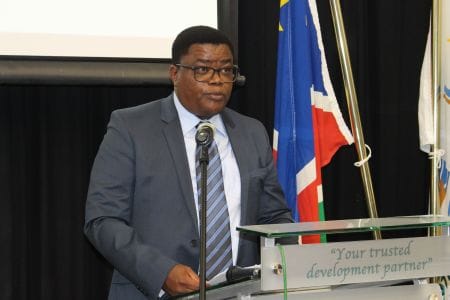Corridor group booms in 2023

Source: The Namibian
Author: Matthew Dlamini
The Walvis Bay Corridor Group (WBCG) moved more goods to and from the port last year, compared to the previous year, says chief executive Hippy Tjivikua.
The company moved 2,4 million tonnes of cargo last year, a significant increase from the 1,6 million tonnes in 2022. Tjivikua is positive the group can move more freight this year.
"We put up targets on an annual basis as to what we want to achieve in terms of cargo values we move for every individual market, and we also want to have the fastest turnaround times from pick to port," he says.
Recently speaking to McCloskey by Opis, a Dow Jones company, Tjivikua said the group was now benefiting from infrastructure development initiated more than five years ago, including a good road network.
"Namibia's road infrastructure has been rated as the best in Africa for many consecutive years, because we invested, we continue investing, and we also maintain and upgrade the current road infrastructure," he said, adding that the group also looked at how to make the port of Walvis Bay more efficient.
"We reclaimed 40 hectares of land from the ocean, where we built a new container terminal. That new container terminal is basically also for us to increase the cargo volumes of the container traffic," he said.
Tjivikua said when the group, a public-private partnership, created the new container terminal five years ago at the port of Walvis Bay, it opened up space, and now it has been developing north of the port of Walvis Bay to expand in terms of world capacity.
"We anticipate more volumes. I think we have more interconnectivity at this moment, which is not fully utilised. We have capacity, and we visit and talk to the markets to identify different commodities we can transport," he said.
Tjivikua said the group was also looking at moving more coal from Botswana, having transported 200 000 tonnes, but coal prices have gone down and the demand has also dropped, which significantly also changes the volumes.
He said transporting some of the commodities, like coal, by road would not be sustainable as opposed to rail.
He said the project office is currently negotiating with those who have been shortlisted, and the infrastructure connection between Namibia and Botswana is not merely for coal transportation, but should be for various minerals and various imports - even agricultural production or imports and exports.
"We're looking at the diversity of goods and even the movement of people . . . and it looks positive. We expect the construction of a railway line and maybe the ground-breaking to be done within the next two years," he said.
The Walvis Bay Corridor Group is a public-private partnership established to promote the use of the Walvis Bay Corridors, a network of transport corridors principally comprising the port of Walvis Bay, the Trans-Kalahari Corridor, the Trans-Caprivi Corridor, the Trans-Cunene Corridor, and the Trans-Oranje Corridor to connect southern Africa to the rest of the world.
Members of the group include the Namibia Ports Authority, the Roads Authority, the Road Fund Administration, the ministries of industrialisation and trade, works and transport, home affairs and finance and public enterprises.
The WBCG also has other transport and logistics companies from the region and abroad as associated members.
* email: [email protected]
